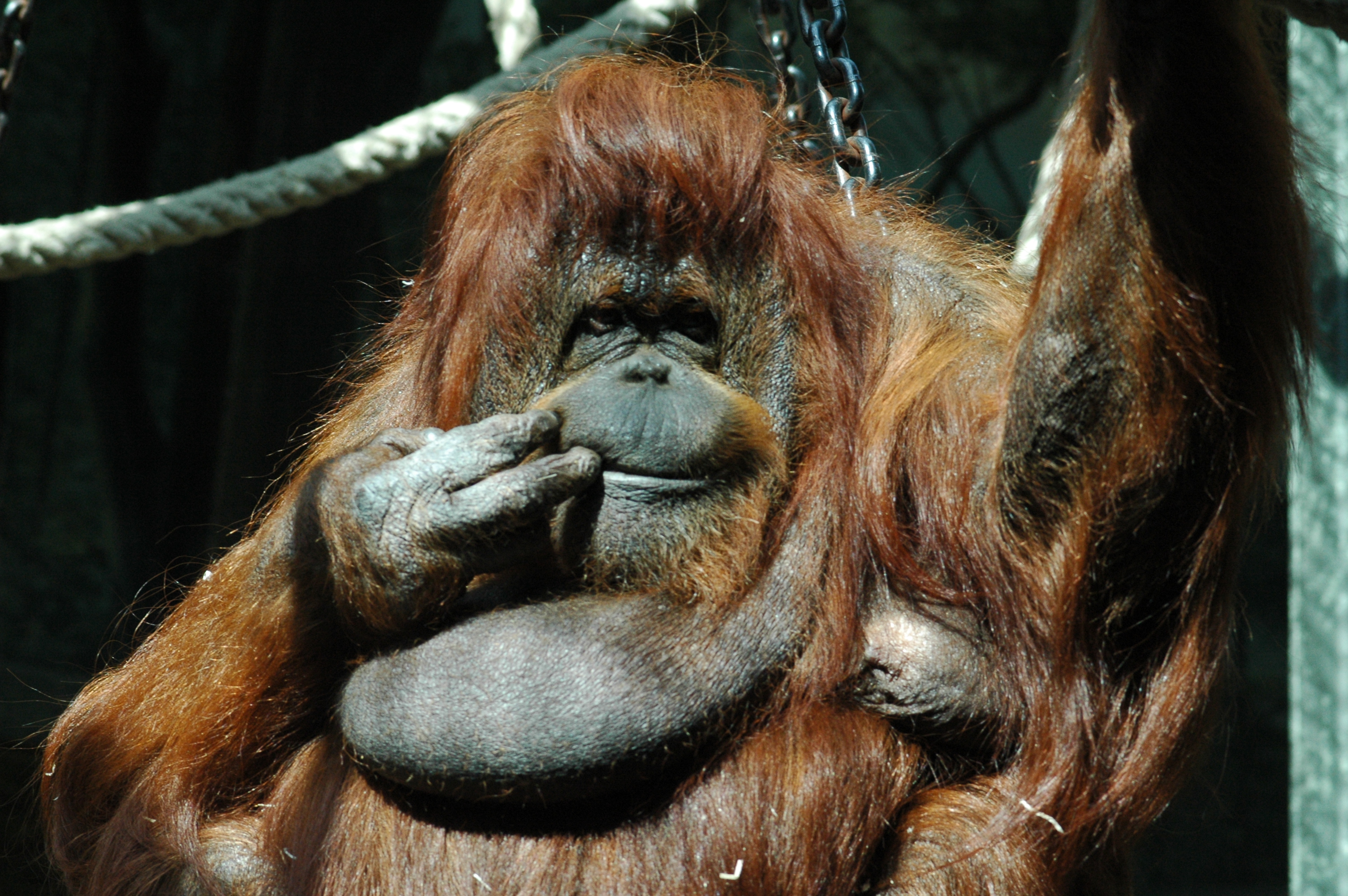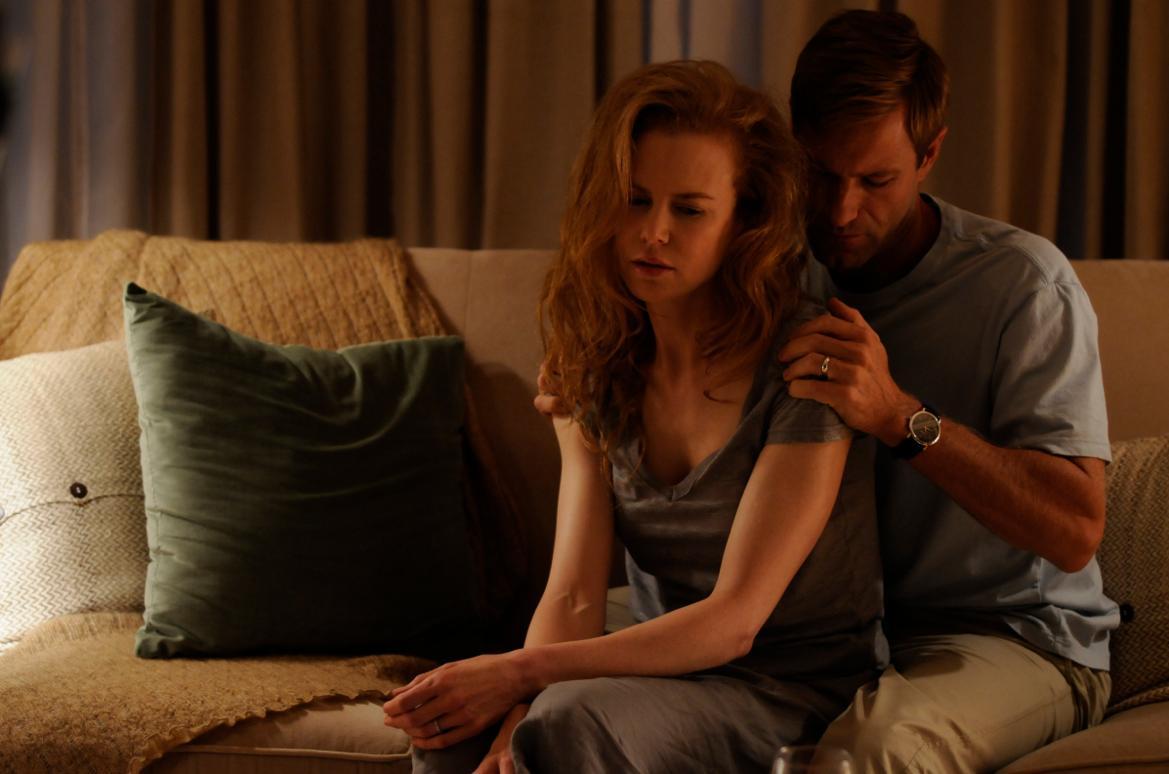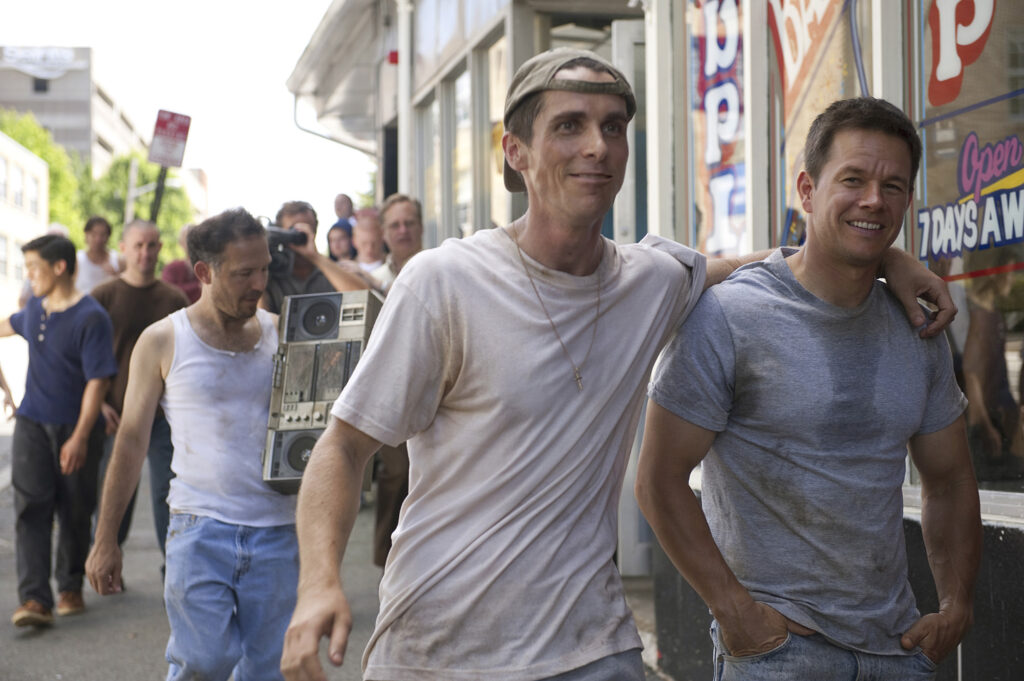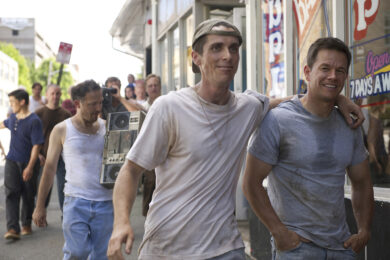The Fighter
This isn’t strictly a boxing film. It’s about boxing in a similar way that The Godfather is about gun fighting. Essentially, The Fighter plays out a volcanic family’s tensions whereby boxing is the language that enables their dysfunctional love and various self-interests to be communicated. Approaching The Fighter in this way seems to be the only means of exercising it from the spectre of Rocky, that still haunts any filmic attempt to engage with the sport.
The Fighter is based on a true story about Micky (Mark Wahlberg), an amateur boxer approaching the end of his career who sees one last ditch attempt at glory ahead of him. Managed by his crack addicted brother Dickie (Christian Bale), whom Micky has idolised from a young age and who was himself a semi-successful boxer, Micky must discern the motivations and importance of his family against achieving his dream of becoming a boxing champion.
David Russell’s obsession with disruptive and disjointed family units reaches new levels of curiosity as Micky’s personal life is gouged at from various parties. He’s tenaciously managed by his mother, Alice (Melissa Leo), whose peroxide hair and seductive dress sense suggests her own attempt at a last-ditch-cling to eroding glory. She uses Micky as a mine to finance her jewellery collection, while Dicky exploits his brother’s pummellings to fund his crack addiction. Alice is backed up by a gang of seven sisters (all amazingly based on Micky and Dicky’s real life sisters) who charge around with such fierce sass they wouldn’t need caricaturing to be placed in a John Waters movie. David Russell commented that The Fighter had scored surprisingly highly with female audiences in test screenings, perhaps because dominant female characters are usually just written as men with boobs (see Salt) and so this brilliant collection of women – individually incredible and collectively over-powering – offer an often hidden characteristic of the fairer sex.
When Micky meets barmaid Charlene (Amy Adams), her attempts to help him with his career lead to brutal hostility from his family, who accuse her of tearing up their family. While this is going on, Dicky’s drug-addled thoughtlessness lands him in prison, and Christian Bale’s performance deserves all the praise and Oscar fanning he is receiving. He leaps into the skin of Dicky with the kind of vigour and conviction that’s become expected of him, and despite some of his remarkable past performances, this is without a doubt his best and most convincing. Most of his performance is improvised, and it’s well worth sticking around for the credits where clips of the real life Micky and Dicky bantering in a bar acts as an amusing finale.
Nénette

Director Nicolas Philibert’s (Etre et Avoire) brilliant documentary supposedly centres round an elderly female orangutan, Nénette, yet its focus expands more to our perception of our own relationship with the animal. Humans only appear in the film as faceless voices, juxtaposed with the orangutans who remain silent. This forms a pattern in which the two species are held apart whilst the film carries out a comparative merging by way of the various narrators’ anthropomorphic descriptions of the animals. Nénette is always viewed from behind her glass cell, only observed as part of a world transparently separated from ours.
Looking as if she’s fallen out of a club at 5:00am in 1993, Nénette gazes mopped, matted and dazed out of her transparent impound. As visitors to the zoo stare back as if trapped in a Victorian freak show, the facial expressions and subtle eye movements of Nénette and her family picked out by the camera almost show them reacting in kind and sadness to the comments thrown their way. At the same time, workers at the zoo talk about Nénette as if she were a person, having bonded over several years with her.
The film assumes both contrary opinions that the orangutan is a beast to be kept behind bars for our amusement and that it is basically an overgrown, unkempt human. Reports from early adventurers encountering orangutans that speak of them dining and sitting with native people – even serving tea – seem wildly unreal, yet the recognisable responses and descriptions of their personal habits allow these accounts to be indulged as plausible
As the oldest female, Nénette’s psychological state is analysed in remarkably familiar terms, suffering unease at not being able to relate to the younger generation. It’s not until the notion of the glass between the two worlds breaking is posited that Nénette is couched as a wildly different creature as she turns from fluffy attraction to public enemy within seconds.
The paradox of the zoo is implicitly sketched: it’s either a prison detaining the animals from their natural habitat or a luxury hotel catering for their natural indulgences. It’s an important and controversial point, yet taking sides on the matter requires first aligning with one of the many positions the film holds in front of it like a set of scales – namely, that we are both related and unrelated to Nénette.
By the end it’s nearly impossible to tell whether you’re watching an essentially less articulate person or a giant meaty flower, whose natural responses to the world can only be discerned as humanlike by way of massive leaps of delusion. It’s a remarkable film that can create such various responses and reflections from such a simple concept. Yet just like the orangutan, the film’s stance on the anthropomorphic queries raised is silent…
Rabbit Hole

This exploration of the grieving process sways between lightweight and pleasingly cryptic. Following the sudden death of their only son, picture perfect couple Becca (Nicole Kidman) and Howie’s (Aaron Eckhart) diverse reactions show their struggle to come to terms with their loss. Kidman’s marble performance plays to her strengths, and is certainly her most alluring since Lars von Trier’s obscure Dogville.
Based on Pulizer Prized-winning play, writer David Lindsay-Abaire affectively stirs the conflict of blame as the inevitable unconscious claw that lashes out when a meaningless tragedy occurs. The ‘what ifs’ that are thrown around never reveal one act or person to blame that would help exercise the couple’s grieving, and instead leads to greater frustration. This appears when they attend group sessions with other recently bereaved parents, where the disillusionment with religious rhetoric is given a short – perhaps too obvious – talk down.
As a central emotional strand, grief sits quite potently on a film and can often crush it with over sentimentality; sympathy and fear jut out so forcefully that drama can become over indulgent. Rabbit Hole provides a subtle inroad to the couple’s turmoil, showing their grief through peculiar behaviour. Of course, as the film is based on a play, expect the inevitable tears and shouting scenes – and conversations taking place while driving – yet these are well placed as means of drawing intrigue, as opposed to piling on cheap tension.
At the meetings, the couple cross paths with obsessive griever Gabby (Sandra Oh), who’s been attending the sessions for eight years. After eventually losing her husband she forms an increasingly intimate relationship with Howie. Not to be outdone in secret liaisons, Becca regularly meets up with high school student Jason (Miles Teller). An impressionable and ruminative young man, his comic books based on parallel worlds offer Becca comfort that nicely parallels that of the Christians whom she had recently berated. Again, gag reflexes are put on standby when a winsome young man starts going all Donnie Darko, but its pertinence is merely instrumental in making this separate observation and is not itself dawdled on. It’s as if the filmmakers at every point dangle a shitty carrot in front of the audience only to snatch it away and reveal an intent that’s both broader and more rewarding in the distance.



